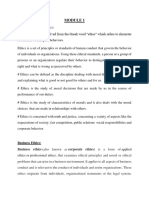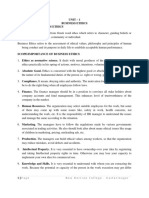SOCIAL ETHICS AND BUSINESS ETHICS
SOCIAL ETHICS AND BUSINESS ETHICS
Uploaded by
saskedudsCopyright:
Available Formats
SOCIAL ETHICS AND BUSINESS ETHICS
SOCIAL ETHICS AND BUSINESS ETHICS
Uploaded by
saskedudsCopyright
Available Formats
Share this document
Did you find this document useful?
Is this content inappropriate?
Copyright:
Available Formats
SOCIAL ETHICS AND BUSINESS ETHICS
SOCIAL ETHICS AND BUSINESS ETHICS
Uploaded by
saskedudsCopyright:
Available Formats
SOCIAL ETHICS AND BUSINESS ETHICS
By: Psyche D. Fadrigo
SOCIAL ETHICS = the systematic reflection on the moral dimensions of social structures, systems, issues, and
communities. Social ethics can be thought of as a branch of 'applied ethics,' the application of ethical reasoning to
social problems.
Social Ethics Touches All Interests
To plan a life means to track the consequences of one's ordinary desires, economic, sexual, social; the desires for
power and responsibility, for case and pleasure, for self-expression, for security, for adventure, for popularity.
Why is it important to study social ethics?
1. Studying ethics can help you appreciate ethical problems.
2. Behaving ethically may help the long-term success of a business.
3. Behaving ethically is often correlated with behaving legally.
Social ethics is the systematic reflection on the moral dimensions of social structures, systems, issues, and
communities. Social ethics can be thought of as a branch of 'applied ethics,' the application of ethical reasoning to
social problems.
Applied Ethics = also called practical ethics, is the application of ethics to real-world problems. Practical ethics
attempts to answer the question of how people should act in specific situations.
A typical list of the kinds of issues addressed under the rubric of social ethics includes:
1. DISTRIBUTION OF ECONOMIC GOODS
2. RESEARCH ON HUMAN SUBJECTS
3. ANIMAL RIGHTS
4. DISCRIMINATION AND AFFIRMATIVE ACTION
5. ABORTION
6. PORNOGRAPHY
7. CRIME AND PUNISHMENT
8. WAR AND PEACE
SOCIAL ETHICS OF BEHAVIOR
It seeks to understand how people actually behave when confronted with ethical dilemmas. It refers to behavior that is
judged according to generally accepted norms of behavior.
WHAT ARE THE ETHICS OF THE SOCIETY?
The ethics of a society is embedded in the ideas and beliefs about what is right or wrong, what is a good or bad
character; it is also entrenched in the conceptions of satisfactory social relations and attitudes held by the members of
the society.
BUSINESS ETHICS = is a form of applied ethics or professional ethics, that examines ethical principles and moral
or ethical problems that can arise in a business environment. It applies to all aspects of business conduct and is
relevant to the conduct of individuals and entire organizations.
What Does Business Ethics Means?
1. Comprises principles and standards that guide behavior in the world of Business.
2. Acceptable or Unacceptable Behavior within or outside the organization.
3. Is determined by key holders.
4. What is right and wrong, good and bad, harmful or beneficial regarding decisions and actions in and around
organizational activities.
Two Key Branches of Business Ethics
1. Descriptive Ethics = also known as comparative ethics, is the study of people's beliefs about morality.
2. Normative Ethics = the study of principles, rules or theories that guide our actions and judgment.
12 Principles of Business Ethics
1. Honesty = Honesty requires a commitment to telling the truth, regardless of the consequences.
2. Integrity = Being ethical in business means maintaining a high level of personal integrity. This is how you earn the
trust of others.
3. Keeping Promises = Your word is one of the most important tools in your arsenal as a business manager.
4. Loyalty = No ethical behavior can be promoted without trust. And for trust, loyalty needs to be demonstrated.
5. Fairness = Biases and personal beliefs are to be avoided in business decision-making processes.
6. Caring = This involves having a genuine concern for others, as well as a sense of compassion.
7. Respect = Treating others with respect is a core principle in business ethics.
8. Law Abiding = Strict adherence to legal standards is foundational. Compliance with data protection laws is an
example of this in action.
9. Fulfilling Commitments = Businesses are also to stay faithful to agreements with employees.
10. Leadership = Demonstrated by a conscious effort to set a positive example of ethical behavior, leadership is a
commitment to excellence.
11. Reputation and Morale = Build and protect the company’s reputation and morale of its employees.
12. Accountability = the quality or state of being accountable. especially : an obligation or willingness to accept
responsibility.
Importance of Business Ethics
1. Ethical Motivation = It protects and improves reputation of the organization by creating efficient and productive
environment.
2. Balance the needs and wishes of the stakeholders = Business ethics requires businesses to think about the impact of
its decision on stakeholders who are directly or indirectly affected by those decision.
You might also like
- Plaintiff Requests Vaccination Passport Order From DefendantsDocument1 pagePlaintiff Requests Vaccination Passport Order From DefendantsCanadian Society for the Advancement of Science in Public PolicyNo ratings yet
- 1st Commandment (10 Commandments of Game)Document4 pages1st Commandment (10 Commandments of Game)Brandon JenkinNo ratings yet
- Sharanjitsa1 3195640 Nurs324 Assignment 2 Dropbox Philosophy of Nursing Scholarly Paper Assignment 2-3Document11 pagesSharanjitsa1 3195640 Nurs324 Assignment 2 Dropbox Philosophy of Nursing Scholarly Paper Assignment 2-3api-29178843567% (3)
- BE - MODULE 1 - Nature and Essence of Business EthicsDocument11 pagesBE - MODULE 1 - Nature and Essence of Business EthicsGeetha MNo ratings yet
- Business EthicsDocument10 pagesBusiness EthicsUpasana PanesarNo ratings yet
- Ethics & Business Ethics: Ivancevich J MDocument8 pagesEthics & Business Ethics: Ivancevich J MMohiminul IslamNo ratings yet
- What Are Business Ethics Lecture OneDocument5 pagesWhat Are Business Ethics Lecture Oneydzx9hjszzNo ratings yet
- Unit-1-Introduction To Business EthicsDocument11 pagesUnit-1-Introduction To Business EthicsGholam Syedain KhanNo ratings yet
- Reviewer in EthicsDocument4 pagesReviewer in EthicsAlliah PesebreNo ratings yet
- Business Ethics NoteDocument54 pagesBusiness Ethics NoteSheetal Karmacharya100% (1)
- Unit 1 IntroductionDocument78 pagesUnit 1 IntroductionPratik PrajapatiNo ratings yet
- Business EthicsDocument5 pagesBusiness EthicsShaikh Juned SaoudNo ratings yet
- CH 01Document33 pagesCH 01Kshitij vijayNo ratings yet
- Module 5 EthicsDocument31 pagesModule 5 EthicsSreelekshmi S RNo ratings yet
- Jasjeet Contemporary FileDocument24 pagesJasjeet Contemporary Filemadhavchitkara20No ratings yet
- Business EthicsDocument102 pagesBusiness Ethicsమధు సూదన రావు100% (6)
- Business Ethics & Professional ValuesDocument15 pagesBusiness Ethics & Professional ValuesRahul D Basu100% (1)
- Chapter One-CSRDocument9 pagesChapter One-CSRMilkias MuseNo ratings yet
- Business Ethics - Nature & Scope - 123939423Document25 pagesBusiness Ethics - Nature & Scope - 123939423Ramalingam ChandrasekharanNo ratings yet
- MODULE - 5-Ethical and Governance WPS OfficeDocument25 pagesMODULE - 5-Ethical and Governance WPS OfficeBharath MNo ratings yet
- Professional Accounting Ethics Chapter 2Document4 pagesProfessional Accounting Ethics Chapter 2Indah Safhira100% (1)
- Business Ethics Unit 1Document21 pagesBusiness Ethics Unit 1priyankaNo ratings yet
- Business Ethics Notes Bba First YearDocument14 pagesBusiness Ethics Notes Bba First Yearpratibhamishra5966100% (2)
- Work Ethics-Nature and Scope Meaning of Work EthicsDocument10 pagesWork Ethics-Nature and Scope Meaning of Work EthicsJacob Toms Nalleparampil100% (1)
- Business Ethics and Corporate GovernanceDocument37 pagesBusiness Ethics and Corporate Governancebabujaya851No ratings yet
- Ethics: Objectives of BUSINESS ETHICSDocument200 pagesEthics: Objectives of BUSINESS ETHICSsandeep sandyNo ratings yet
- GOOD GOVERNANCE AND SOCIAL RESPONSIBILITY Module 3Document25 pagesGOOD GOVERNANCE AND SOCIAL RESPONSIBILITY Module 3Jericho DadoNo ratings yet
- Bissiness Ethic's Notes Unit - 1 To 3Document25 pagesBissiness Ethic's Notes Unit - 1 To 3Ishan GuptaNo ratings yet
- Ethics and Corporate Social Responsibility SlideDocument30 pagesEthics and Corporate Social Responsibility Slidetanymislam70iuNo ratings yet
- AE10Document9 pagesAE10jayNo ratings yet
- The Importance of Ethics in BusinessDocument27 pagesThe Importance of Ethics in BusinessSederiku KabaruzaNo ratings yet
- Unit1 BeDocument43 pagesUnit1 BeamiteshnegiNo ratings yet
- ACG Assignment Part 2Document4 pagesACG Assignment Part 2Bhuwan GuptaNo ratings yet
- Chapter 5 (Review Questions)Document3 pagesChapter 5 (Review Questions)Hads LunaNo ratings yet
- Business EthicsDocument39 pagesBusiness EthicsKhaled AlhowaimelNo ratings yet
- UNIT 1 PpleDocument23 pagesUNIT 1 Pplenareshreddy.m.002No ratings yet
- Ethics Individual AssignmentDocument4 pagesEthics Individual AssignmentIan MurimiNo ratings yet
- Module OneDocument14 pagesModule OneNaveen Jacob JohnNo ratings yet
- Acc 112Document34 pagesAcc 112Lexy Jill Teves BarrientosNo ratings yet
- 3HS01 EthicsDocument12 pages3HS01 EthicsJainamNo ratings yet
- Module 7 Q1 Ethicalbehaviorin HRMDocument11 pagesModule 7 Q1 Ethicalbehaviorin HRMprabodhNo ratings yet
- EthicsDocument100 pagesEthicsabhishekknpy21No ratings yet
- Ba 203 Social PhilosophyDocument24 pagesBa 203 Social PhilosophyKath HidalgoNo ratings yet
- Unit 3Document7 pagesUnit 3Koustov ChoudhuryNo ratings yet
- BECSR Cha 1Document8 pagesBECSR Cha 1kirubelyitayalNo ratings yet
- BECSR ETHICSDocument19 pagesBECSR ETHICSHemant PhukanNo ratings yet
- Business Ethic & Corp GovernanceDocument22 pagesBusiness Ethic & Corp GovernanceSUHANA TABSUMNo ratings yet
- Business EthicsDocument12 pagesBusiness EthicsSachin AsundiNo ratings yet
- Professional EthicsDocument16 pagesProfessional EthicsakashdeepNo ratings yet
- Submitted By: Submitted To: Icitss-Itt-16Document16 pagesSubmitted By: Submitted To: Icitss-Itt-16Rahil NarangNo ratings yet
- HVE NotesDocument16 pagesHVE NotesSaksham AroraNo ratings yet
- Ethics Unit I NotesDocument43 pagesEthics Unit I NotesscubhaNo ratings yet
- Cgbermic - Chapter 5 Review QuestionsDocument3 pagesCgbermic - Chapter 5 Review QuestionsFirelight ZyNo ratings yet
- CorporateDocument24 pagesCorporatelalchiprimeNo ratings yet
- Professional Ethics & Human ValuesDocument27 pagesProfessional Ethics & Human ValuesSrini VasanNo ratings yet
- BE Notes 2021Document35 pagesBE Notes 2021Madhusudhan JoshiNo ratings yet
- IESL B Paper 2011 Sep Q2 AnswerDocument6 pagesIESL B Paper 2011 Sep Q2 AnswerGlishna Peushan Widanapathirana100% (6)
- Business Ethics NotesDocument30 pagesBusiness Ethics NotesrachitNo ratings yet
- Business Law Final-1Document9 pagesBusiness Law Final-1foodverse96No ratings yet
- Business Ethics Unit 1Document22 pagesBusiness Ethics Unit 1Khilendra Sahu100% (2)
- Introduction To Ethics (Notes)Document10 pagesIntroduction To Ethics (Notes)Shakti rathore government studentNo ratings yet
- MAS 4 GROUP 2 Business Ethics ADocument23 pagesMAS 4 GROUP 2 Business Ethics ASadile May KayeNo ratings yet
- Screenshot 2023-03-19 at 15.21.35Document16 pagesScreenshot 2023-03-19 at 15.21.35neempubgNo ratings yet
- Mpa - Pa 213 (Hbo) Sept 18, 2021 Class Note Report Ajnaira UdenDocument22 pagesMpa - Pa 213 (Hbo) Sept 18, 2021 Class Note Report Ajnaira UdenRafsanjani AbasNo ratings yet
- Sources of MoralityDocument11 pagesSources of MoralityElaine Samaniego100% (1)
- Toward Active Reflexivity Positionality and Practice in The Production of KnowledgeDocument5 pagesToward Active Reflexivity Positionality and Practice in The Production of KnowledgeThoriso Terrence MokgalagadiNo ratings yet
- Instant Access to Introduction to Business Ethics 6th Joseph DesJardins An Joseph DesJardins ebook Full ChaptersDocument24 pagesInstant Access to Introduction to Business Ethics 6th Joseph DesJardins An Joseph DesJardins ebook Full Chapterslelatafarse100% (2)
- Air Force RotcDocument9 pagesAir Force RotcLloyd VillamilNo ratings yet
- Strategic Decision Making Final AssignmentDocument7 pagesStrategic Decision Making Final AssignmentAndre IndrawanNo ratings yet
- Ferrell BE 13e CH02 Student PPT FinalDocument34 pagesFerrell BE 13e CH02 Student PPT FinalSwiftyyNo ratings yet
- Video Analysis Assignment 2Document4 pagesVideo Analysis Assignment 2api-642452301No ratings yet
- Gad Plan and Budget 2021 GataDocument8 pagesGad Plan and Budget 2021 GataHELEN CASIANONo ratings yet
- Estoppel: Contracts A, University of South Australia DR Michelle FernandoDocument12 pagesEstoppel: Contracts A, University of South Australia DR Michelle FernandoRj JNo ratings yet
- 1 ABC Enterprises Has Created Multiple Codes of Conduct ApplicaDocument1 page1 ABC Enterprises Has Created Multiple Codes of Conduct Applicajoanne bajetaNo ratings yet
- Business Ethics and Social Responsibility Grade 12Document18 pagesBusiness Ethics and Social Responsibility Grade 12Raymond RocoNo ratings yet
- Almacin, Janah Ayessa - RS ReflectionDocument1 pageAlmacin, Janah Ayessa - RS ReflectionJanah AlmacinNo ratings yet
- Advanced 1 Workbook Pages 79 81Document3 pagesAdvanced 1 Workbook Pages 79 81Manuel IbañezNo ratings yet
- Stev en Kessler: The First Two Steps in Inner WorkDocument2 pagesStev en Kessler: The First Two Steps in Inner WorkZulaiha IbrahimNo ratings yet
- MGT501 Tutorial Topic 6Document3 pagesMGT501 Tutorial Topic 6Caron KumarNo ratings yet
- Zica Manual - Part A, B, C and D ContentsDocument431 pagesZica Manual - Part A, B, C and D ContentsKabutu Chuunga100% (2)
- Dialog B.ingDocument2 pagesDialog B.ingAlya SaputriNo ratings yet
- Community Civic Association: Talk Is Good But What'S Next?! From The Managing EditorDocument2 pagesCommunity Civic Association: Talk Is Good But What'S Next?! From The Managing EditorWeinland Park Community Civic AssociationNo ratings yet
- Lesson 3 Defining Terms in The Study: What To Know!Document11 pagesLesson 3 Defining Terms in The Study: What To Know!Trixie TorresNo ratings yet
- Law SectionDocument2 pagesLaw SectionTeliah ThyssenNo ratings yet
- Aquinas Custom and The Coexistence of Infused and Acquired Cardinal VirtuesDocument24 pagesAquinas Custom and The Coexistence of Infused and Acquired Cardinal VirtuessilverianoNo ratings yet
- IO - Sentence StemsDocument1 pageIO - Sentence StemsPayNo ratings yet
- EthicsDocument9 pagesEthicsMJ UyNo ratings yet
- TFN Module 2M Transes BSN 1GDocument4 pagesTFN Module 2M Transes BSN 1GbhfhewknsNo ratings yet
- Assessment3 CareCoordinationPresentationDocument5 pagesAssessment3 CareCoordinationPresentationMATCH masterNo ratings yet

























































































